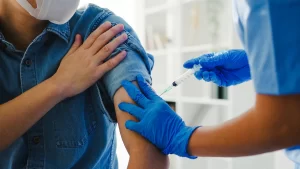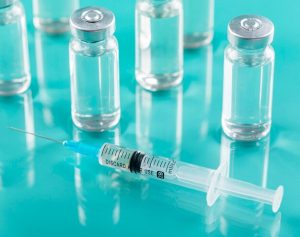About Vaccines
Francisco Stefano – Director
Mailén Agüero – Business Analyst
Vaccination not only protects those who have received a vaccine, but also those around them.
Vaccines are medicines that are administered so that the immune system recognizes the presence of a germ (virus, bacteria, etc.) and causes a rapid rejection response to the infection.
Most vaccines contain a weakened or inactivated (killed) form of a virus or bacteria or a small part of the virus or bacteria that cannot cause disease. This is called an antigen.
This creates a “memory” in the immune system. This immunological memory allows the body to “remember” a specific virus or bacterium, triggers immune cells to kill the disease-causing virus or bacterium and produces antibodies against it.
Later, if the person comes into contact with the actual virus or bacteria, their immune system will remember this and can quickly produce the correct antibodies and activate the correct immune cells to kill the virus or bacteria.
Vaccination not only protects people who have received a vaccine. Decreasing the risk of exposure to infection also indirectly protects unvaccinated people in the community, such as children who are too young to be vaccinated or people with weakened immune systems.
Types of vaccines
Live attenuated vaccines fight viruses and bacteria. These vaccines contain a version of the live virus or bacteria that has been weakened so that it does not cause serious illness in people with healthy immune systems. Because live attenuated vaccines are the closest thing to a natural infection, they are good teachers for the immune system. For example, the measles, mumps, and chickenpox vaccine. Although they are very effective, not everyone can receive these vaccines. Children with weakened immune systems cannot receive live vaccines.
Non-live vaccines also fight viruses and bacteria. These vaccines are made by inactivating or killing the germ during the vaccine-making process. Inactivated polio vaccine is an example of this type of vaccine. Multiple doses are often needed to develop and/or maintain immunity.
Toxoid vaccines prevent diseases caused by bacteria that produce toxins (poisons) in the body. In the process of making these vaccines, the toxins are weakened so they cannot cause disease. The weakened toxins are called toxoids. When the immune system receives a vaccine that contains a toxoid, it learns to fight the natural toxin. The DTaP vaccine contains diphtheria and tetanus toxoids.
Subunit vaccines include only parts of the virus or bacteria instead of the entire germ. Because these vaccines contain only the essential antigens and not all the other molecules that make up the germ, side effects are less common. The DTaP vaccine’s Pertussis (whooping cough) component is an example of a subunit vaccine.
Conjugate vaccines fight a type of bacteria that has antigens with an outer shell of sugar-like substances called polysaccharides. This type of coating disguises the antigen, making it difficult for a young child’s immature immune system to recognize and respond to it. Conjugate vaccines are effective against this type of bacteria because they link (or conjugate) the polysaccharides with antigens to which the immune system responds very well. This link helps the immature immune system to react to the coating and mount an immune response. An example of this type of vaccine would be the COVID-19 vaccine.
Different vaccines produce different levels of protection. The duration of protection also depends on the disease against which it protects. Some vaccines can only protect against disease for a short time and may require booster doses; for others, immunity can last a lifetime.
For some vaccines (mainly non-live vaccines), the first dose does not provide as much protection as possible. Therefore, more than one dose is needed to develop more complete immunity. For example, the Hib vaccine that protects young children against meningitis requires 2 or 3 doses depending on the manufacturer.
For some vaccines, the protection begins to wear off over time. At that time, a “booster” dose is needed to restore protective levels. This booster dose is usually given several years after the initial vaccine doses are given.
Vaccines are the surest way to protect yourself against certain diseases and prevent serious illnesses. Natural infections can cause serious complications and be fatal. This is true even for illnesses that many people consider minor, such as chickenpox. It is impossible to predict who will get serious infections that can lead to hospitalization or even death. That is why vaccines are the best way to protect people.
Subscribe to
#AmarinNews
Partner with us!
We offer expertise and experience, together with flexibility and the ability to adapt to your needs.
- info@amarintech.com.ar
- +54 11 4588-6500
- Sanchez 2045 (C1416BQG), Buenos Aires, Argentina.



